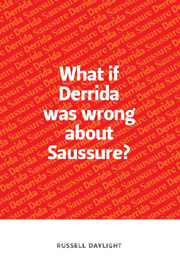Book contents
- Frontmatter
- Contents
- Acknowledgements
- Abbreviations and Textual Notes
- Introduction
- 1 Classical Semiology
- 2 The Originality of Saussure
- 3 The Concept of the Sign
- 4 Writing, Speech, and the Voice
- 5 The Sign as Representation
- 6 Linguistic Identity
- 7 The Sign and Time
- 8 The Horizon of Language
- Conclusion
- List of Works by Derrida and Saussure
- References
- Index
8 - The Horizon of Language
Published online by Cambridge University Press: 12 September 2012
- Frontmatter
- Contents
- Acknowledgements
- Abbreviations and Textual Notes
- Introduction
- 1 Classical Semiology
- 2 The Originality of Saussure
- 3 The Concept of the Sign
- 4 Writing, Speech, and the Voice
- 5 The Sign as Representation
- 6 Linguistic Identity
- 7 The Sign and Time
- 8 The Horizon of Language
- Conclusion
- List of Works by Derrida and Saussure
- References
- Index
Summary
Let us start again, one final time, from the conclusions and questions of the previous chapters. First, in examining how Derrida and Saussure each approach the question of linguistic identity, it was discovered that the role allocated to the language user is critical. We understand that, for Saussure, linguistic identity is more a matter of linguistic identification, and is solely in the hands (or brains) of the language user. And when we say that meaning is determined by language users, we might also say that meaning resides within consciousness. However, it is precisely this privilege given to language users, and to consciousness, that Derrida's discourse would wish to question. The critique that has been deferred – to this point – is that Saussurean language theory fails to question the origin and constitution of ‘consciousness’. Hence, the apparent unity of consciousness is only a metaphysical presupposition which depends upon a more originary potentiality.
Second, in responding to Derrida's critique of the temporality of the sign, it was discovered that – while certainly acknowledging the constant evolution of languages, and the derivation of the current state of the language from a previous state – Saussure continues to assert the radical synchrony of the language system. To do so is also, as we have seen, to radically problematise the determination of diachronic identity and the value of historical explanation in language. What is important for this final chapter is understanding that to privilege the point of view of language users is, at the same time, to privilege synchrony as: ‘the only relevant psychological reality for current speakers of the language’ (Harris 2001: 197).
- Type
- Chapter
- Information
- What if Derrida was wrong about Saussure? , pp. 147 - 171Publisher: Edinburgh University PressPrint publication year: 2011



